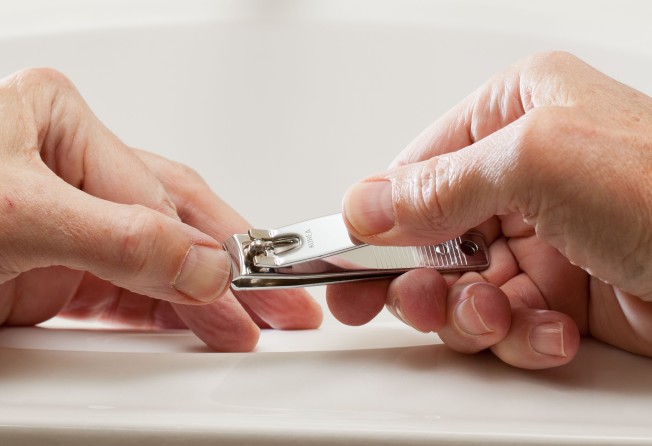
Hatred of sound, or misophonia: triggers, treatments and the noises that can make you want to hurt your family
- Pen clicking, throat clearing, nail clipping – these are just some of the sounds that are like a red rag to a bull for misophonia sufferers
- One psychologist says it could be because the brain misinterprets certain auditory stimuli and experiences it as toxic or dangerous

Cathy Alter, The Washington Post
It started with a tuna salad sandwich. In seventh grade, I would often go to my friend Beth’s house after school. Her mother would have snacks waiting for us on the kitchen table. It’s difficult to estimate how many times I sat down at that table with no incident – 50, maybe? – until something happened that would forever change me.
On this particular day, the sound of Beth nibbling her crust like a baby squirrel made me so angry, so atypically full of rage, that I wanted to reach across the table and break something.
Things only got worse as I got older. Whether it was a college roommate’s habit of glugging Old Milwaukee lager or my first boyfriend’s penchant for chomping his gum (like a cow chewing its cud, as my grandfather would say) it was hard for me to hear anything other than the sounds coming out of their mouths. It was even harder not to envision exactly how I would kill them.
I didn’t know it at the time, but I suffer from misophonia, a chronic condition characterised by intense feelings of rage, fear and – especially when listening to my husband, Karl, crunch his way through a bag of potato chips – anxiety so acute that I feel as though I’m having a heart attack at least twice a day.
Logically, Karl knows misophonia exists, but that doesn’t stop the eye-rolling whenever I remind him, through clenched teeth, to please eat more quietly. That partners often have a hard time buying into the condition adds one more layer of angst.

Misophonia has long been a secret of my family, so shameful that we’ve never addressed it directly until now. Looking back, the signs of my father’s suffering were all around the kitchen table, shooting my brother and me dirty looks for slurping our soup or sucking up the final drops of juice. My brother, I recently discovered, suffers as well, though his condition operates at a simmer compared with my boil; his bugaboos are pen clicking and throat clearing. The symptoms are most severe in a teenage family member who can’t even stand the sound of her parents breathing.
According to experts, misophonia almost always begins in late childhood or early adolescence. It worsens over time, often growing to include more trigger sounds – in my case, nail clipping and silverware scraping against teeth, in addition to chewing. I understand that eating is a basic part of both our physiological and our social lives, yet I find myself unable to reconcile this truth with the sound this truth produces. Instead, I want to run away.
“For people who suffer, it’s as though the brain misinterprets the auditory stimuli and experiences it as harmful or toxic or dangerous,” says Jennifer Brout, a psychologist based in Connecticut, US, who specialises in treating children with misophonia. The body responds, she says, by going into fight-or-flight mode. “It happens in a millisecond.”
Many doctors have never even heard of the condition, and when patients do describe their symptoms, they are sometimes dismissed as being oversensitive or diagnosed with a mood disorder
To help explain the mechanics of misophonia, Brout uses the example of a sleeping dog hearing, say, a door clicking shut. “The dog’s response is to wake up and think: is that something I need to be aware of?” If so, the dog barks or runs off to hide. If not, the dog goes back to sleep and pays no more attention to the sound. “In misophonia, there is no decrease in response; there is an increase,” Brout says. “You just keep alerting to the sound.”
The underlying causes of misophonia are, for now, unknown. Nor do scientists know how many people are affected. “In terms of research, it’s still in its infancy,” Brout says.
Brout, a mother of triplets, knows first-hand how confusing and heartbreaking it is to suffer from the condition: one of her daughters showed signs of misophonia at just two years old. “While we were all eating, she picked up her plate and took it out of the kitchen. It was our chewing noises that were disturbing her.”
Brout says she went from being baffled by her daughter’s behaviour to recognising it in herself. “I thought, ‘Oh, that’s what’s wrong with me, too.’ Before, I thought I was a moody person who was just hypersensitive.” Brout’s bête noire is throat clearing.

At the time, 1998, so little was understood about the condition that there wasn’t even a name for it. For two years, Brout and her daughter went from doctor to doctor searching for help. “One doctor said we should just name the disease after ourselves,” Brout says, laughing. “For a while we just called it the chewing disease.”
She eventually stumbled upon the work of Pawel and Margaret Jastreboff, doctors who were treating patients at Emory University for tinnitus, a ringing in the ears, and hyperacusis – conditions in which sound is perceived as abnormally loud or physically painful.
The couple noticed that some of their subjects had a specific type of decreased sound tolerance, where specific patterns of sounds, rather than decibel levels, set them off. Something, they hypothesised, was amiss between the auditory pathways in the brain and the pathways in which emotions are processed. In 2001, the Jastreboffs proposed the name for this condition, calling it misophonia, which means hatred of sound.
“If you don’t have a name, then it doesn’t exist,” Pawel Jastreboff says.
But even with a name, misophonia is not officially listed as a diagnosis in any medical manuals, including the latest edition of the American Psychiatric Association’s Diagnostic and Statistical Manual of Mental Disorders. That makes it more difficult for doctors to identify and for insurers to cover the unproved treatments related to it.
Many doctors have never even heard of the condition, and when patients do describe their symptoms, as Brout and her daughter discovered, they are sometimes dismissed as being oversensitive or given a diagnosis of a mood disorder. (Brout recommends these resources for patients or parents of patients: the International Misophonia Research Network, Misophonia International and Misophonia Kids.)
“So far, there has been no controlled scientific data to support a specific treatment for misophonia,” says Zachary Rosenthal, chief psychologist and director of the Centre for Misophonia and Emotion Regulation at Duke University in North Carolina, US. The centre, which Rosenthal launched through philanthropic support in February, is so new that it doesn’t have a website. It will conduct research as well as educate and train clinicians.
Rosenthal, whose wife suffers from the condition, says the centre’s priority is to define misophonia and develop a scale to measure it. “Let’s characterise what it is, make a good measure of it [and] figure out what hearing and psychological processes are related to it,” he says. “And why these specific sounds? How does misophonia develop in the first place? These questions all need to be answered to inspire treatment development.”
Rosenthal says people routinely approach him and his colleagues seeking treatment for misophonia. “It’s challenging,” he says. Until we know more scientifically, he believes, treatment should be multidisciplinary and include evaluations from an audiologist, occupational therapist and a psychologist.
Even though there is no agreed-upon definition, measurement or treatment for misophonia, I find it comforting to know that I’m not the only one suffering. And I know my future might hold one small mercy: at 86, my father’s hearing is not what it used to be, a relief that surely awaits us all.